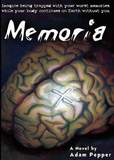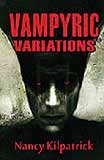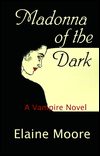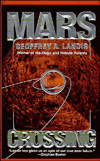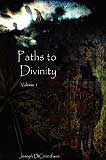
Paths to Divinity, by Joseph DiCristofano
Book Review by Michael D. Griffiths
Have you read this book?
Paths to Divinity, by Joseph DiCristofano is a self-published series of
short stories that orbit several types of Speculative Fiction.
Everything from Supernatural Adventure, to Horror, and even Fantasy can
be found within the pages of what claims to be volume one of a series.
The book itself is rather short. There are only seven stories and the
page count is 152.
The first story, Hydromancy 101, is a rather trite title for what is probably the strongest story of the bunch. This is sort of an Indiana Jones meets Lovecraft sort of thing, which the author is obviously writing as a tip of the hat to both genres. The plotline switches from the safari into the depths of Africa, back to the story teller being kept in a locked down psych ward. DiCristofano takes his time and the tension is good. Only issue is that he actually alludes to Indiana Jones in the story and mentions the Arc of the Covenant too.
Up second, we have Feels Like Home, which is a serial killer tale. After the well written story above, I felt a little jerked out of my socks to be forced into the head of a serial killer while he tortures a poor girl. I like horror: I do not like torture porn crap. Moving on.
Third in the lineup is The Passing of Eric Webber. In this a solider in Nazi Germany meets his end and is confronted by the Grim Reaper. DiCristofano does a good job building up the background for the dying man and the tale is a bit funny, but I have also read similar tales a few dozen times.
In Divine Vemgence, DiCristofano jumps back into pop culture by using King Leonidas from the movie 300 and ancient Greece too, of course. Perhaps the author was angry that the deformed Greek that betrayed the brave 300 warriors gets away with it, for he brings Leonidas back from the dead so he can get his revenge. I liked the use of Greek Gods here, but was not completely sure they were used accurately.
Duality, is a twin story. One is good and the other is evil or maybe one is popular and the other nerdy. Maybe it was both. Or maybe I was watching that movie with the two twins that were doctors, you know the one with Jeremy Irons. They were pretty similar, you know like twins.
Thy Kingdom Found, is the second best story here and probably the only other one that could have been publishable. A young girl comes upon the Garden of Eden and ends up befriending both the serpent and the angel that live there. As she grows older, she visits them and they enjoy seeing her no matter how she ages. This is almost like a fairy tale and could even be read to children. Again however the author uses a cliche instead of exploring something new.
We end with The Genesis of Incarnates: The Path to Divinity. The title is almost as long as the story. This is some random dark ramble of the kind we hope we only see in a self-published book. Yes, not everything you bang out on a rainy Saturday is fit for print.
I hate to be overly harsh with anyone's labor of love and there are a few good tales here. Not great, but good enough to be published in maybe a small indie magazine. But... I have a few problems with this book. First off the stories are too disorganized. I do not mind chaos, in principle, but there is no theme here. You just get the feeling: heroes, serial killers, whatever I feel like. This really has the feel of some guy that worked on a few stories that had nothing to do with each other. Then, whether they were good or bad, he just grabbed them all up and paid to have them published. Add to this the fake intro that calls the author a genius, (Written by someone else, rightttttttttt) and we have a bit of a groaner on our hands.
Again, I hate to be cruel, but books like this are enough to make writers like all those publishers and editors that reject our work nine times out of ten. There should be some damage control in place over what books make it to print, but these days, with self-publishing, that is not always the case. Still DiCristofano did have a few stories that kept my attention and also moved his grade up to where it is.
The first story, Hydromancy 101, is a rather trite title for what is probably the strongest story of the bunch. This is sort of an Indiana Jones meets Lovecraft sort of thing, which the author is obviously writing as a tip of the hat to both genres. The plotline switches from the safari into the depths of Africa, back to the story teller being kept in a locked down psych ward. DiCristofano takes his time and the tension is good. Only issue is that he actually alludes to Indiana Jones in the story and mentions the Arc of the Covenant too.
Up second, we have Feels Like Home, which is a serial killer tale. After the well written story above, I felt a little jerked out of my socks to be forced into the head of a serial killer while he tortures a poor girl. I like horror: I do not like torture porn crap. Moving on.
Third in the lineup is The Passing of Eric Webber. In this a solider in Nazi Germany meets his end and is confronted by the Grim Reaper. DiCristofano does a good job building up the background for the dying man and the tale is a bit funny, but I have also read similar tales a few dozen times.
In Divine Vemgence, DiCristofano jumps back into pop culture by using King Leonidas from the movie 300 and ancient Greece too, of course. Perhaps the author was angry that the deformed Greek that betrayed the brave 300 warriors gets away with it, for he brings Leonidas back from the dead so he can get his revenge. I liked the use of Greek Gods here, but was not completely sure they were used accurately.
Duality, is a twin story. One is good and the other is evil or maybe one is popular and the other nerdy. Maybe it was both. Or maybe I was watching that movie with the two twins that were doctors, you know the one with Jeremy Irons. They were pretty similar, you know like twins.
Thy Kingdom Found, is the second best story here and probably the only other one that could have been publishable. A young girl comes upon the Garden of Eden and ends up befriending both the serpent and the angel that live there. As she grows older, she visits them and they enjoy seeing her no matter how she ages. This is almost like a fairy tale and could even be read to children. Again however the author uses a cliche instead of exploring something new.
We end with The Genesis of Incarnates: The Path to Divinity. The title is almost as long as the story. This is some random dark ramble of the kind we hope we only see in a self-published book. Yes, not everything you bang out on a rainy Saturday is fit for print.
I hate to be overly harsh with anyone's labor of love and there are a few good tales here. Not great, but good enough to be published in maybe a small indie magazine. But... I have a few problems with this book. First off the stories are too disorganized. I do not mind chaos, in principle, but there is no theme here. You just get the feeling: heroes, serial killers, whatever I feel like. This really has the feel of some guy that worked on a few stories that had nothing to do with each other. Then, whether they were good or bad, he just grabbed them all up and paid to have them published. Add to this the fake intro that calls the author a genius, (Written by someone else, rightttttttttt) and we have a bit of a groaner on our hands.
Again, I hate to be cruel, but books like this are enough to make writers like all those publishers and editors that reject our work nine times out of ten. There should be some damage control in place over what books make it to print, but these days, with self-publishing, that is not always the case. Still DiCristofano did have a few stories that kept my attention and also moved his grade up to where it is.
|
Click here to buy Paths to Divinity, by Joseph DiCristofano on Amazon
|
Paths to Divinity, by Joseph DiCristofano on Amazon

| More Books You Might Like |
Comment on Paths to Divinity, by Joseph DiCristofano
| Comments on Paths to Divinity, by Joseph DiCristofano |
| There are no comments on this book. |
